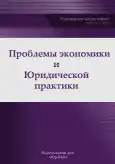Legal Audit of Disputes
- Authors: Kashirskaya L.V.1, Zurnadzhyants Y.A.2
-
Affiliations:
- FGOBU VO «Financial University under the Government of the Russian Federation»
- Astrakhan State Medical University
- Issue: Vol 18, No 1 (2022)
- Pages: 36-44
- Section: Articles
- URL: https://journal-vniispk.ru/2541-8025/article/view/147380
- ID: 147380
Cite item
Abstract
Full Text
##article.viewOnOriginalSite##About the authors
Liudmila V. Kashirskaya
FGOBU VO «Financial University under the Government of the Russian Federation»
Email: kashirskaya76@mail.ru
Dr. Sci. (Econ.), Associate Professor; professor of the Audit and Corporate Reporting Department Moscow, Russian Federation
Yulia A. Zurnadzhyants
Astrakhan State Medical University
Email: julia.zur@yandex.ru
Cand. Sci. (Econ.), Associate Professor; Associate Professor of Department of economics and health care management with postgraduate course Astrakhan, Russian Federation
References
- Arbitration Procedural Code of the Russian Federation No. 95-FZ dated 07/24/2002 (as amended on 07/01/2021, with amendments. dated 22.07.2021).
- Civil Code of the Russian Federation No. 51-FZ dated 30.11.1994 (as amended. from 28.06.2021 No. 225-FZ).
- Civil Procedure code of the Russian Federation of November 14, 2002 No. 138-FZ (as amended on 01.07.2021).
- The code of Administrative Offences from 30.12.2001 № 195-FZ (ed. from 01.07.2021).
- Malinina, L. Yu. A contract for the provision of audit services: legal and economic aspects: monograph / L. Y. Malinin. -Moscow: INFRA-M, 2020. 103 p.
- Audit methodology: procedures, tips, recommendations: monograph / D. Y. Samygin, N. G. Baryshnikov, A. A. Tuskov [et al.]; edited by N. G. Baryshnikov. -Moscow: INFRA-M, 2020. 231 p.
- The Tax Code of the Russian Federation. Part One of July 31, 1998 No. 146-FZ. Part Two of August 5, 2000 No. 117-FZ.
- Parasotskaya N.N. Accounting: modern challenges, priorities and ways of development. volume 4. Monograph / N.N. Parasotskaya. -M.: Rusajns, 2018. 352 p.
- Romaninina V. V. Legal support of professional activity: textbook for SPO. Moscow: Academy, 2016. 222 p.
- Suglobov, A. E. Methodological support of the audit of organizations in the conditions of insolvency (bankruptcy): monograph / A. E. Suglobov, A. I. Vorontsovas, E. A. Orlova. -Moscow: RIOR: INFRA-M, 2020. 173 p.
- The Labor Code of the Russian Federation No. 197-FZ of December 30, 2001 (as amended on 06/28/2021).
- Federal Law No. 127-FZ of 10/26/2002 «On Insolvency (Bankruptcy)».
Supplementary files








